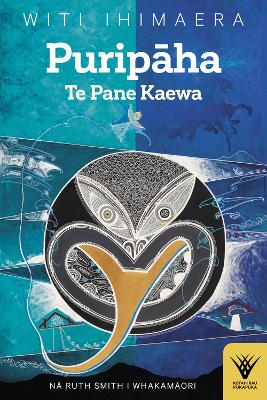Kotahi Rau Pukapuka
1 primary work
Book 6
He whakamaoritanga i te pukapuka o Puripaha na Witi Ihimaera mo etahi whanau hoariri e rua ki Te Tairawhiti.
Ko Puripaha te tapanga ka tukuna ki Te Pane Kaewa, a, ki Te Tairawhiti o Aotearoa e pakanga ana etahi kokoro tokorua kia whakawahia hai pane.
Ko Tamihana te upoko o te whanau toa o Mahana, he whanau kuti hipi, he whanau hakinakina hoki. Ko Rupeni Poata tona ito. He rite tonu te tutakitaki a nga whanau nei i nga mahi hakinakina, i nga whakataetae a-ahurea me te whakataetae Piriho Koura e kitea ai te mapu kuti hipi toa katoa o Aotearoa. I waenganui pu, ko te taitama, ko Himiona, ko te mokopuna a te kokoro raua tahi ko tona kuia, ko Ramona, e pakanga ana i ona ake kare a-roto, i ona ake whakapono ano hoki i te riri e tutu ana i nga wahi katoa.
Ko te toa o te 1995 Montana New Zealand Book Award, kua whakatinanatia hirahiratia ki te kiriata o Mahana, a, e aroha nuitia ana e nga whakareanga kaipanui maha. Ma tenei whakamaoritanga e tutaki ai tetahi minenga hou ki a Puripaha, ki tetahi o nga tino pukapuka o roto i tona momo.
________
A te reo Maori translation of Witi Ihimaera's award-winning novel about two rival Maori families on the East Coast, Bulibasha.
Bulibasha is the title given to the King of the Gypsies, and on the East Coast of New Zealand two patriarchs fight to be proclaimed the king.
Tamihana is the leader of the great Mahana family of shearers and sportsmen and women. Rupeni Poata is his arch enemy. The two families clash constantly, in sport, in cultural contests and, finally, in the Golden Fleece competition to find the greatest shearing gang in New Zealand. Caught in the middle of this struggle is the teenager Simeon, grandson of the patriarch and of his grandmother Ramona, struggling with his own feelings and loyalties as the battles rage on many levels.
Winner of the 1995 Montana New Zealand Book Award, brilliantly realised in the film Mahana and loved by generations of readers, this powerful te reo Maori translation of a New Zealand classic will introduce Bulibasha to a whole new audience.
Ko Puripaha te tapanga ka tukuna ki Te Pane Kaewa, a, ki Te Tairawhiti o Aotearoa e pakanga ana etahi kokoro tokorua kia whakawahia hai pane.
Ko Tamihana te upoko o te whanau toa o Mahana, he whanau kuti hipi, he whanau hakinakina hoki. Ko Rupeni Poata tona ito. He rite tonu te tutakitaki a nga whanau nei i nga mahi hakinakina, i nga whakataetae a-ahurea me te whakataetae Piriho Koura e kitea ai te mapu kuti hipi toa katoa o Aotearoa. I waenganui pu, ko te taitama, ko Himiona, ko te mokopuna a te kokoro raua tahi ko tona kuia, ko Ramona, e pakanga ana i ona ake kare a-roto, i ona ake whakapono ano hoki i te riri e tutu ana i nga wahi katoa.
Ko te toa o te 1995 Montana New Zealand Book Award, kua whakatinanatia hirahiratia ki te kiriata o Mahana, a, e aroha nuitia ana e nga whakareanga kaipanui maha. Ma tenei whakamaoritanga e tutaki ai tetahi minenga hou ki a Puripaha, ki tetahi o nga tino pukapuka o roto i tona momo.
________
A te reo Maori translation of Witi Ihimaera's award-winning novel about two rival Maori families on the East Coast, Bulibasha.
Bulibasha is the title given to the King of the Gypsies, and on the East Coast of New Zealand two patriarchs fight to be proclaimed the king.
Tamihana is the leader of the great Mahana family of shearers and sportsmen and women. Rupeni Poata is his arch enemy. The two families clash constantly, in sport, in cultural contests and, finally, in the Golden Fleece competition to find the greatest shearing gang in New Zealand. Caught in the middle of this struggle is the teenager Simeon, grandson of the patriarch and of his grandmother Ramona, struggling with his own feelings and loyalties as the battles rage on many levels.
Winner of the 1995 Montana New Zealand Book Award, brilliantly realised in the film Mahana and loved by generations of readers, this powerful te reo Maori translation of a New Zealand classic will introduce Bulibasha to a whole new audience.
